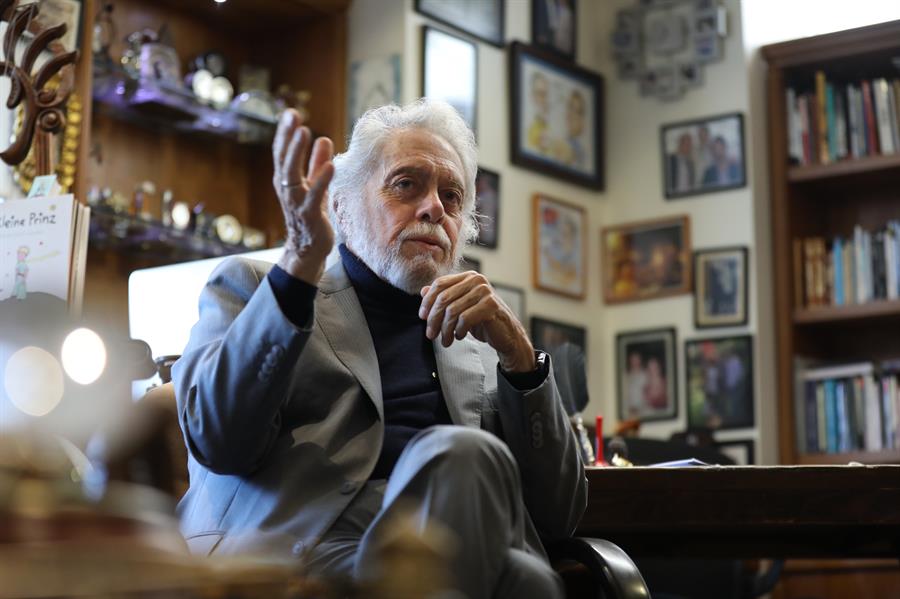Within the facilities of the “independent city” of Televisa San Ángel, there is a building in which the future talents who star in its programs are trained: it is the Center for Artistic Education (CEA) that after 34 years has evolved thanks to the pandemic.
“It is a pity that the lifestyle was modified, but we have a philosophy: things are as they are, whether we understand them or not and we move forward at all times,” says the actor, producer, and director of CEA, Eugenio Cobo in an interview.
Actresses and actors who now enjoy their fame in Hollywood such as Salma Hayek, Eiza González, Ana de la Reguera, or José María Yazpik, to name a few, passed through the corridors of the school.
In 1978 Cobo, born in Mexico City in 1939, was called by the vice president of Televisa to give him a risky task: to shape the rickety model for the training of actors that the company had then and to build a school dedicated to the production of talent.
“Before, the producers would meet young people in a theater and try to prepare them to join the soap operas,” recalls the teacher from what he considers his “home”, a picturesque office flooded by the sound of thousands of clocks from all over the world. sizes are given to you.
“I’m like a village doctor, everyone brings me gifts,” he says.
Based on three fundamental educational pillars, the acting, the corporal, and the cultural theory, the CEA trains between 50 and 70 students per generation who aspire to become professional actors and to be part of the largest media company in Latin America.
“The CEA is not an economic business for Televisa, all students receive scholarships without paying registration or tuition. It is a benefit and is a unique link with the field of work,” Cobo explains.
This freedom allows teachers, synodical, and directors to be more careful when selecting students and refutes one of the biggest myths that has been formed around the school: “it is a lie that we only select handsome men”, he says Eugene.
According to the director’s data, at least 70% of any Televisa production, from conductors to actors, are former students of CEA.
PERSONALITY, MULTICULTURALITY
Year after year the school receives around 5,000 applications from young people between the ages of 16 and 24 from all over the world, although last year 7,000 were interested.
As it is there where they are taught to act, Cobo assures that the most important thing about the auditions is the personality of each of the young people.
From this immense number of applications, around 600 people will have a face-to-face audition that will be supervised by renowned producers and directors, to finally be left with 50 to 70 of whom only 25 to 30 students will survive after three years of intense training.
Just last year they received applications from all of Latin America and countries such as Bulgaria, Croatia, Slovenia, Russia, the United Arab Emirates, Angola, and the Czech Republic, to name a few.
“We do not teach them to be soap opera actors, we teach them to be actors, period. What do actors do? They play characters and seek to convince viewers of what they are feeling, if they do well they achieve empathy,” he clarifies.
COVID-19 AND THE FUTURE
The green traffic light that Mexico City is currently facing due to the covid-19 pandemic has allowed certain activities of the school to be reactivated little by little, such as the acting and television workshop.
However, the distancing forced by the coronavirus brought some positive things that Eugenio prefers to highlight, before the negative ones.
“The emergency began and two weeks passed and all the teachers adapted to continue with the nine hours a day online, we evolved,” he asserts.
One of the most notable construction processes was creativity when approaching projects and he cites the work of an “enthusiastic teacher” who mounted the play “Cats” from a distance.
“They had to learn to edit, they were never together so they also experienced what it was like to record in the cinema, they learned more things,” he considers.
Currently, the CEA is already preparing to receive a new generation of young people for January 2022, so the director is in the middle of the selection process.



















































































